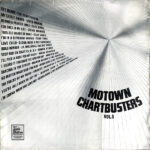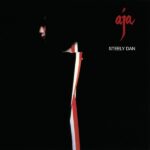 There’s no other way of saying this; 2020 has been an awful year and it’s been hard to take any kind of consolation from it. Anyone in the world of music has had to look long and hard to take any positives out of this situation. For many of us, it’s been an opportunity (or maybe a necessity) to look in the rear-view at some of the things we did in the past; gigs that we went to, albums that we bought and people that we met. I’ve moved around the country a fair amount and, in the era before media players and streaming, I had to limit the music I could move around with me. I’m not saying I was limited to five albums or, later, CDs, but these are albums that always made the cut and they’ve still had the same comfort blanket value through two lockdowns. In chronological order:
There’s no other way of saying this; 2020 has been an awful year and it’s been hard to take any kind of consolation from it. Anyone in the world of music has had to look long and hard to take any positives out of this situation. For many of us, it’s been an opportunity (or maybe a necessity) to look in the rear-view at some of the things we did in the past; gigs that we went to, albums that we bought and people that we met. I’ve moved around the country a fair amount and, in the era before media players and streaming, I had to limit the music I could move around with me. I’m not saying I was limited to five albums or, later, CDs, but these are albums that always made the cut and they’ve still had the same comfort blanket value through two lockdowns. In chronological order:
 “Motown Chartbusters Vol. 3” – Various Artists
“Motown Chartbusters Vol. 3” – Various Artists
I know; it’s a compilation, but what a compilation. This was the soundtrack of my teenage years; every youth club disco, every party, every time I went to a friend’s house, this album was there. It was perfect timing, with a 1969 release just at the time that I really started to listen to music properly and had a few quid from my paper round to actually buy records.
The Chartbusters series started in 1967; if you’re a cynic, you might accuse Motown of trying to recycle material but it is the music business and it’s fair to say that this series was packed with hits. It was basically a singles industry at that time, so a compilation from a successful company made a lot of sense. So why Vol. 3? Well, the sleeve design evolved as the series progressed, reflecting current social themes, but Vol. 3 was the one where the designers nailed it; it’s simple, bold and incredibly striking and the musical content lived up to the standard of the design.
If a sixteen-song album starts with Marvin Gaye’s “Grapevine” and ends with Smokey’s “Tracks of my Tears”, there’s a lot of wiggle room for the other fourteen songs. Throw in a couple of Stevie Wonder classics, The Temptations’ “Get Ready” and Edwin Starr’s “Stop Her on Sight” and you’ve already got a classic compilation. Take a look at the entire album and it’s studded with classics and minor classics. That’s why it will always have a place in my elite albums.
I bought this the week it was released in September 1977 and took it with me to Dundee for my second year at University. I was in a shared room, but it was with Kev, my room-mate from my first year. We both played guitar and had some musical tastes in common; thankfully Steely Dan was one of those shared tastes. “Aja” was played a lot and we may have smoked some recreational substances, which may have enhanced the listening experience. In my final two years, I had my own room and, again, “Aja” didn’t stay in its sleeve very long. It was starting to look a little worse for wear. You can read the next part of this story in this piece; I don’t want to do it in detail again here. Let’s just say it burned “Aja” into my consciousness and since that time the album’s been a constant companion.
I’d been a Dan fan since the early days and, by this time, I knew to expect the unexpected but this album was something else. They had seven beautifully-constructed and slightly sleazy songs (ok, maybe more than slightly sleazy) and spent studio time with the best session musicians in the world putting together versions of the songs, picking out the seven favourites for the album. They started as jazzers playing rock and with “Aja” they arrived at jazzers playing jazz or maybe jazz-funk; going back to their roots. Like all of the albums mentioned here, this should be in everyone’s collection. It was certainly in the collection of the next band.
I’m Scottish; I’m proud to be a Scot and I used to love the times when the music industry radar periodically located Scotland on the UK map. The mid-to-late eighties was one of those periods; Deacon Blue were one of the bands to be signed and they’re still recording and gigging today. I saw them at Cornbury a couple of years ago and they sounded great with songs covering a period of thirty years. The band members mostly have new day jobs now; Ricky Ross is a radio broadcaster and Dougie Vipond is a TV presenter with BBC Scotland, but that’s all irrelevant when the sticks click and the band fires up.
I bought “Raintown” on vinyl originally and I still have that copy now. The title song was a tribute to Glasgow that spliced Blue Nile with Springsteen to create a wide canvas sound that came to define the band. As much as I loved that song, and the anthem “Dignity”, it was “When Will You (Make my Telephone Ring?)” that I connected with. It was a soul song (they even had Jimmy Helms on BVs) and it was over the top and gorgeous. It was part of an album that you needed to listen to from start to finish (turning over the vinyl halfway through), because you wouldn’t want to miss out on the opener “Born In a Storm” or the yuppie tale “Chocolate Girl”.
And you know that the Steely Dan connection is “Deacon Blues” from “Aja”, obviously.
When the Britpop wars broke out, I was missing in action. Why would anyone hitch themselves to bands that were so obviously influenced by sixties pop. Oasis was The Beatles without the subtlety and Blur was an arch Goldsmiths-enabled Kinks tribute band. We had to be better than that and I’d already committed myself to a band that had much more in common with the East Midlands surroundings I knew as a teenager. The band was from Sheffield and the songs reflected life in the North Nottinghamshire/Derbyshire/South Yorkshire area; Blur and Oasis were copying sixties bands while Pulp felt much more like a musical interpretation of Stan Barstow’s short stories.
“His ‘n’ Hers” was the breakthrough album: it wasn’t the album with the anthems that followed it and turned Pulp into an arena and Glastonbury-headlining band. “Different Class” featured “Common People” and “Disco 2000”, both complete bangers and remixed to within an inch of their lives; as much as I loved them, I still identified much more with the characters and the narratives of “Lipgloss”, “Babies”, ”Acrylic Afternoons” and “Do You Remember the First Time?”. This is still my favourite Pulp album and probably my favourite ‘Britpop’ album.
Only a few months after “His ‘n’ Hers” and so different. If Sheffield defined Pulp, then Bristol defined Massive Attack. The first Massive Attack album “Blue Lines” three years earlier was already firmly embedded in my consciousness. “Unfinished Sympathy” was a classic single and Shara Nelson had a perfect voice to front up the songs. Massive Attack wasn’t a prolific band (quality rather than quantity) and by the time “Protection” came along, Shara had moved on, replaced by a mix of singers and rappers including Tracey Thorn, Tricky, Nicolette and Horace Andy. Along with close neighbours Portishead, Massive Attack defined trip-hop, mixing influences from hip-hop and dub, creating a sound that was both ambient and punchy.
The title song has always pushed my buttons; it’s gorgeous. The bass is thunderous (particularly for a slow ballad), while the guitar, keys and vocals are all crystal clear with a shimmering touch of reverb. The mix is full of space and all of the individual elements stand out. And there’s Tracey Thorn’s almost effortless but incredibly powerful vocal. It’s a classic song and it sets the tone for the album; loads of punchy bass and spacy, dubby mixes – trippy even. The kind of music that might accompany a spliff or two. Which takes us back to my second selection.
 Hyperbole surrounding the importance of 18+’s identity, ironically a key selling point for this celebrity-averse duo’s brand, has run its course. In some ways it was only a matter time. Interviews are given, live performances attended and there, smack bang in the centre of “Trust”’s cover art, the couple finally appear, photographed together, in brutal and beautiful profile. If American musicians Samia Mirza and Justin Swinburne (previously referred to as just Boy and Sis) had wanted to remain anonymous for longer, then they could have done but the decision to be unmasked appears to be of their own making. After months of slightly sinister CGI videos, which could have gone much further than they did, we now can reimagine these songs with portraits of the actual performers themselves and not the carefully stage-managed visuals as dictated by the duo. Whether or not this has been a mistake and somehow weakened the appeal of 18+ isn’t important. What we have been ultimately left with is the music unaccompanied by any surplus hype. “Trust” is not a multi-media release and thankfully there is just enough sonic expertise and craft to allow it to stand unassisted.
Hyperbole surrounding the importance of 18+’s identity, ironically a key selling point for this celebrity-averse duo’s brand, has run its course. In some ways it was only a matter time. Interviews are given, live performances attended and there, smack bang in the centre of “Trust”’s cover art, the couple finally appear, photographed together, in brutal and beautiful profile. If American musicians Samia Mirza and Justin Swinburne (previously referred to as just Boy and Sis) had wanted to remain anonymous for longer, then they could have done but the decision to be unmasked appears to be of their own making. After months of slightly sinister CGI videos, which could have gone much further than they did, we now can reimagine these songs with portraits of the actual performers themselves and not the carefully stage-managed visuals as dictated by the duo. Whether or not this has been a mistake and somehow weakened the appeal of 18+ isn’t important. What we have been ultimately left with is the music unaccompanied by any surplus hype. “Trust” is not a multi-media release and thankfully there is just enough sonic expertise and craft to allow it to stand unassisted.
‘Lap, fuck, hair, fingers, taste, down, spit, clit, dry’; words that you’ll hear more than once over “Trust”’s playing time confirming a persistent, glitchy nihilistic tone throughout. 18+ really enjoy singing about sex but whether they actually enjoy it is unclear. All of the tracks on “Trust” have been selected from their previous three mixtapes and 18+ have been making music together for several years now, so unless you’re completely unfamiliar with their material there are no surprises here. “Crow”, one of the duo’s biggest songs to date, still stands out as the most accessible and immediate track due to repetitive tropes including finger- clicks, booming bass and, appropriately enough, a crow’s caw. It is also one of the album’s most melodic moments, something that 18+ need to focus on, and features a typically slippery but assertive vocal from Mirza who welcomingly refuses the victim role throughout.
“Forgiven” owes a debt to Kelis’ Milkshake with its skeletal nursery rhyme feel and highly sexualised motifs and “Almost Leaving” is essentially indie shoe-gaze and is quietly lovely. “OIXU”, another highlight, sounds like The xx and Sugababes (first generation) trading verses and chorus respectively. It’s not important that 18+ don’t offer anything original here, it’s the quality that counts after all, but aside from a dominant trap influence it is again nineties trip-hop which most comes to mind. Listen for example to Tricky and Martina Topley- Bird’s “Makes me Wanna Die” and compare its ambitions musically to at least half the tracks here and on many levels it’s difficult to feel that almost twenty years has passed since the former’s release. Of course a lot of trip-hop was interested in exploring emotional connections as well as sexual, much like FKA Twigs today, and this is where the likes of 18+ differ. The faceless and tireless disconnect and reinvention options that the internet offers informs everything about Mirza and Swinburne’s approach including the finished work itself.
18+ had the opportunity on “Trust” to expand and refine their ideas based on what’s come before and maybe that’s the biggest disappointment, their failure to develop or to fill in some of the missing details. Songs where Swinburne dominates, “Club God” for example, don’t work as well, as he just doesn’t have either the presence and authenticity of his partner in crime. Self-contained, claustrophobic and still somewhat shallow, the pair has really worked hard in creating an enveloping, somewhat sleazy mood but occasionally this is at the cost of the required depth or imagination to prevent it becoming, over the course of an entire album, dull and repetitive. There are some sparkling ideas here though and it can be only hoped, following the ultimate reveal of Samia Mirza and Justin Swinburne as 18+, that they can further craft their vision and soundscapes into something even more compelling and consistently captivating.
 In many ways Tahliah Barnett still sounds like many thought the future would in 1995. More sinuous and fragile maybe, but twenty-six year old FKA Twigs is much indebted to the Bristol’s trip-hop takeover in the mid-nineties and in particular Adrian Thaws, AKA Tricky. Along with Massive Attack and Portishead, Tricky defined the period with his doomy and sensual debut album “Maxinquaye” which featured soulfully threatening vocals from his favourite muse Martina Topley-Bird, and it’s this artist who springs to mind more than any other whilst listening Barnett’s vocal abilities. Against the skipping, tapping and whirring percussion noises, sporadic booming bass and hip hop and trap time-signatures, Barnett delivers two variations – a barely-there, traditional r’n’b fluttering falsetto and a surprisingly clear contralto; a marvellous, devastating contrast frequently exchanged during the same song.
In many ways Tahliah Barnett still sounds like many thought the future would in 1995. More sinuous and fragile maybe, but twenty-six year old FKA Twigs is much indebted to the Bristol’s trip-hop takeover in the mid-nineties and in particular Adrian Thaws, AKA Tricky. Along with Massive Attack and Portishead, Tricky defined the period with his doomy and sensual debut album “Maxinquaye” which featured soulfully threatening vocals from his favourite muse Martina Topley-Bird, and it’s this artist who springs to mind more than any other whilst listening Barnett’s vocal abilities. Against the skipping, tapping and whirring percussion noises, sporadic booming bass and hip hop and trap time-signatures, Barnett delivers two variations – a barely-there, traditional r’n’b fluttering falsetto and a surprisingly clear contralto; a marvellous, devastating contrast frequently exchanged during the same song.
t may not be 1995 anymore and explicit and unimaginative sexuality has replaced mystery and ambiguity and this is what has partly driven what seems an uncommonly insatiable appetite for this young singer who almost constantly remains somewhat hidden in all respects. “LP1” was preceded by two 4-track EPs which have served as an introduction to the singer (none of those tracks are included here) and accompanying each of these songs was a highly stylised video; no-one could tell who this person was though, so obscured by the surreal and vivid images – a slippery and repeatedly oral Chris Cunningham cum Grace Jones “Corporate Cannibal” body-morphing aesthetic. These portraits proved irresistible and have made FKA Twigs the absolute doyenne of tumblr cool; the hype starts here indeed. Stripped then of these visuals as one is when listening to the 10 tracks here (at the time of writing only one song has visual accompaniment), the overall impact is not always as strong when relying entirely on melodic and sonic ability but a lot of the time it exceeds what has been heard to date such is the strength of the song writing.
“Two Weeks” is a massive and masterful song, the highlight of “LP1”, and its straight-out-of-the-box perfection would be an achievement for any artist, new or established. Staccato delivery and clipped annunciation surround the only explicit references to sex, and sexual competitiveness, on the album. ‘I can fuck you better than her…..my thighs are apart for when you’re ready to breathe in’ is an example of this but it’s the reference to ‘pull out that incisor’ and ‘flying like a screaming falcon’ that add another altogether otherworldly layer that so befits what we know of Barnett, a darker and by far more disturbing extreme to go to. “Video Girl”, like “Two Weeks”, is another of the more typically structured and sturdier songs which will have people reeling off names like Brandy, Aaliyah and Tweet – sweet-voiced r’n’b artists who actively encouraged producer involvement to create music that was bleaker and more experimental than the norm expected at the time within the genre. But “Video Girl” is autobiographical; it references her time as a dancer in music videos by the likes of Jessie J and Kylie Minogue immediately before this album’s release and the subsequent change of hierarchy. ‘Is she the girl that’s from the video?’ leering demand is met with Barnett’s subsequent denial ‘I can’t recognise me’. The second chorus slows down just enough for the listener to think there may be a fault with their copy of the track, as though it’s malfunctioning; it’s a disquieting and magical little trick.
“Hours” creaks up slowly like a sticky corrugated shutter, produced by indie female favourite Dev Hynes, and has the best example of this soft / hard vocal dynamic where the later verses become strident demands as opposed to the earlier girly infatuations. “Closer” is sublime Gregorian chamber pop ending with the devastating (I think) ‘all these years in isolation, isolation, isolation’ and “Give Up” sees the singer take the role of forceful encourager and rock. “Pendulum” starts with the clack of a stick being rattled around a cotton wool lined barrel with Barnett sounding as though she may dissolve into the background due to emotional upheaval. It’s one of the songs here, and odd therefore that it’s the sole production by pop god Paul Epworth, that feels pleasant enough but inadequate – the most surprising thing you could say about Barnett, certainly. But it’s misleading as eventually it becomes somewhat of a centrally-placed heart to the album and its warmth burns through you. “Lights On” and album closer “Kicks” are at the weaker end of “LP1”, both tracks promise something that never fully develops or is reached and it’s here that Barnett is reminiscent of Kelela’s “Cut 4 Me” and the slow jams that appear on her album. Production levels are startlingly high and the vocals are pure r’n’b sweetness but there is a little either in the way or melody or mood here.
“LP1” is a record that at first seems to be somewhat slight considering the heft of everything that surrounds it. I was lucky enough to have this album a good two weeks before it was released and can say that after initially forming an opinion that wasn’t as favourable as this one, it kept drawing me back. It was as though I hadn’t heard all of the tracks yet but had retained enough of a clatter or a buzz or a divine falsetto being slowed down to a stuttering machine that I needed to go back and finish them properly, to give the record a fair chance. It’s only through these repeated listens that some of the tracks here really show themselves; it isn’t a slight record at all, far from it in fact. FKA Twigs debut is wholly impressive and bewitching and stands up as a cohesive and single-minded debut; let it also be known that she also wrote every track here. A brilliant and wholly exciting new talent on the British black music scene, whatever that music may be.
 Although her first single appeared in 2010 Sky Ferreira has never released an album before. There appears to have been a lot of music recorded over a three year period, talk of albums near to completion and exciting collaborations, but very little has ever seen the light of day. It would appear that this is mainly due to Ferreira herself not being happy to release material that record companies and interested parties want her to release and therefore becoming an artist that certain sections of the music industry would rather not have to deal with. Either she is a highly volatile personality whose ego stands in the way of her producing consistently good material (hi Azealia!) or she is an artist in the more literal sense of the word who wants to only share material that she stands by. It’s satisfying then to hear, based on this new evidence, it is almost certainly the latter.
Although her first single appeared in 2010 Sky Ferreira has never released an album before. There appears to have been a lot of music recorded over a three year period, talk of albums near to completion and exciting collaborations, but very little has ever seen the light of day. It would appear that this is mainly due to Ferreira herself not being happy to release material that record companies and interested parties want her to release and therefore becoming an artist that certain sections of the music industry would rather not have to deal with. Either she is a highly volatile personality whose ego stands in the way of her producing consistently good material (hi Azealia!) or she is an artist in the more literal sense of the word who wants to only share material that she stands by. It’s satisfying then to hear, based on this new evidence, it is almost certainly the latter.
“Night Time, My Time” is a surprisingly taut guitar, drums and synths (in that order) album, with Ferreira herself sounding bright and pouting through the majority of it. The sexuality that informs the NSFW album sleeve portrait translates into the multi-harmonies that make up the wall of sound, mid-sixties girl group album opener “Boys”. The predominant electro-pop sound that runs through the majority of her previous releases does not dominate here and this collection sounds unlike anything else released by a female singer in 2013 who is within the genre of ‘pop artist’. Whilst not a retro album, the spirit of early Blondie, Joan Jett, Siouxsie Sioux and even Kim Wilde are alive and well and it’s these kind of stand-alone punk icons that Ferreira obviously feels a kinship with.
Ariel Rechtshaid (Charlie XCX, Vampire Weekend and Glasser), who produces the entire album, excels at creating wonderfully full soundscapes which bulge with intricate details and neat sonic flourishes (listen to Haim’s thrilling “My Song 5” for an example). On songs like the snarling “Nobody Asked Me (If I Was Okay)” and “Kids In America”-mugging “Ain’t Your Right”, Ferreira and Rechtshaid give “Night Time, My Time” a genuine indie rock-pop authenticity and power as a cohesive body of work and not just an exercise in producer placement. Regardless of whether acoustic specialist Jon Brion or pop god Greg Kurstin had taken the production reins here, as it was previously assumed they might (both have worked successfully with Ferreira before), none of this would work if the songs weren’t good enough, and Ferreira has always had an excess of brilliant tunes.
Fans who may possibly mourn the overall departure of more traditional pop songs like the towering, Kylie-like “One” from 2010 can still find solace here with three nuggets of airy and gleaming brilliance: “24 Hours”, “Love in Stereo” and, in particular, the defiant “I Blame Myself”. The latter finds Ferreira accusing her detractors ‘How could you know what it feels like to fight the hounds of hell? How could you know what it feels like to be outside yourself? You think you know me so well? I just want you to realise I blame myself for my reputation’. And that still doesn’t take into account “Kristine”, a real weirdo of a track, short with deliberately hard to decipher lyrics that seem to reference shopping with said Kristine and the young millionaires with an ever
ascending melody key-line and the admission ‘even though I’m not bright, I can live in the bright town’. Its craziness is unexpected and brilliantly realised.
Ferreira has said that the album’s title comes from a line spoken by the tragic character Laura Palmer in David Lynch’s feature length film “Fire Walk with Me”, more commonly known as Twin Peaks, or at least a less successful prequel to the hugely popular TV show of that name. There is an incredibly affecting scene in the film where Laura Palmer speaks about falling in space and how eventually you would burst into flames and the angels wouldn’t save you as they are all gone. A haunting insight into the lead character’s eventual death, Ferreira incorporates this dialogue into the title track’s lyrics; the bad girl punished by death. It’s a sombre close to an otherwise uplifting and exhilarating album and musically it’s lifted straight from Tricky’s 1995 trip hop classic, ‘Maxinquaye’. It’s sticky and drunken with Ferreira coolly accepting her potential fate. This track alone confirms the risks she clearly wanted to take with her first album, it’s impossible to imagine any one of pop’s golden girls making anything as desolate sounding as this; it’s how you may expect Lady Gaga to sound if you had only seen her.
“Heavy Metal Heart” may go precisely nowhere and “Omanko” takes a novelty turn in the wrong direction but this still doesn’t prevent Sky Ferreira’s album from being a massive achievement. Her current reputation as the hipster bloggers’ poster girl is troubling as it is questionable. How much of that is due to the music as opposed to the image of a seemingly nihilistic, with occasional low self-esteem issues, ex-model? This is a pop artist, though, and image is arguably as important as sound. What Ferreira has done with “Night Time, My Time” is that she has made a record where it isn’t necessary to rely on visual props to fully relate to and enjoy the music. In that way it seems quite old fashioned and there is little doubt whilst listening to it that she loves these songs and making them come to life. If you were impressed but unmoved by some of the bigger, shinier releases from the last four months of 2013, then this album may relieve some of your pessimism. She may have taken an age to do it and it’s very early to say, but Sky Ferriera may have made one of the best albums of 2014.
 Tricky’s debut album “Maxinquaye” came out in 1995 and is now, some eighteen years later, regarded as not only his best work, but also one of the most inspirational and best examples of the trip-hop genre which first appeared in the early nineties. The pressure for him to repeat the success and the sounds contained on “Maxinquaye” seem to have been so great that Tricky has actually stated that this, his tenth album, (I know, it shocked me too) is a return to the essence of his debut and also of him as an artist. This doesn’t sound like the successor to “Maxinquaye” in that an updated version would have to be terrifyingly experimental and claustrophobic, sticky and dark, but “False Idols” is soulful, mature even and the predominant feminine psyche (something which Tricky has always been very much in touch with in both his music and the images that have accompanied it) is represented and presented as vulnerable and maybe damaged but wilful and intact.
Tricky’s debut album “Maxinquaye” came out in 1995 and is now, some eighteen years later, regarded as not only his best work, but also one of the most inspirational and best examples of the trip-hop genre which first appeared in the early nineties. The pressure for him to repeat the success and the sounds contained on “Maxinquaye” seem to have been so great that Tricky has actually stated that this, his tenth album, (I know, it shocked me too) is a return to the essence of his debut and also of him as an artist. This doesn’t sound like the successor to “Maxinquaye” in that an updated version would have to be terrifyingly experimental and claustrophobic, sticky and dark, but “False Idols” is soulful, mature even and the predominant feminine psyche (something which Tricky has always been very much in touch with in both his music and the images that have accompanied it) is represented and presented as vulnerable and maybe damaged but wilful and intact.
This is a fifteen song album and only “Passion of the Christ” features Tricky on his own with no female support and probably sounds exactly as you might imagine it would. There are three female vocalists featured here and the one male guest is the lead singer of The Antlers singing a version of one their own songs. The women here sound and sing like Martina Topley-Bird, not featured here, who performed vocals on Tricky’s first four albums and is rightly considered his ultimate collaborator and muse. “Maxinquaye” was a sample heavy album and Tricky has demonstrated a continued greed for bizarre cover versions (the “Wonder Woman” theme, “Slow” by Kylie, “The Love Cats” and “Happy Talk” amongst others all appear on previous albums) which hasn’t diminished here but these are his most successful interpretations to date.
“Somebody’s Sins”, which is a cover of Patti Smith’s interpretation of Van Morrison’s “Gloria”, is beautifully economical; just Francesca Belmonte’s small but confrontational voice, a bassline and the sound of a muted bee buzzing in a jar and, at barely three minutes long, it’s an impressive opening track. “Valentine” sees Tricky duetting with Chet Baker’s “Funny Valentine”, “Hey Love” uses a two note, instantly recognisable sample from Japan’s “Ghosts” and “Does It” is actually a pretty loyal, albeit more minimal, cover version of the brilliantly threatening “Love Is A Chain Store” by The Ropes. Along with the swooping Massive Attack-lite of “Nothing’s Changed” and Nneka, criminally given only one track, recalling “Raw Like Sushi” Neneh Cherry on “Nothing Matters”, this collection actually sounds like one of the more polite trip-hop releases from the late nineties. Tricky may well have wanted to avoid this but it’s something that he can’t seem to escape and in this instance, it’s not a criticism. Lyrical themes of isolation, class, betrayal and sex remain and occasionally, such as on the low-slung, stop-start funk of “Is That Your Life” where Francesca Belmonte narrates a typical dealer’s day and Tricky mumbles ‘you does your bird, you keeps your word’, it can be clumsy and clichéd and somewhat retrograde.
“False Idols” is occasionally menacing but overwhelmingly intimate, quiet and quite lovely. Admittedly there is filler here and if it were a twelve-track album then a lot of its problems would be solved, but it’s also Tricky’s most cohesive collection in a decade; “False Idols” is maybe a more revealing title than initially assumed. Tricky has made the album he wanted to and has declared that he proudly stands by every song featured. He’s clearly a variation on the person he was almost two decades ago; not the same man but why would he be? To put him on a pedestal and expect him to recreate what’s now considered to be his masterpiece again is naive and misplaced. Tricky has moved on and this album proves that he has to ability and imagination to make material that is maybe minor, but is valid and engaging nonetheless.
 If you had given me this album, Delilah’s debut, and told me it had been in a time capsule since 1995 then I would probably believe you. I haven’t heard anything this influenced by that period’s prominent trip hop sound for a very long time but then everything comes back around again eventually I suppose.
If you had given me this album, Delilah’s debut, and told me it had been in a time capsule since 1995 then I would probably believe you. I haven’t heard anything this influenced by that period’s prominent trip hop sound for a very long time but then everything comes back around again eventually I suppose.
The surprise is that Delilah didn’t go to one of those British stage/ talent schools that Adele (there’s actually a song on here called “21” on here, it’s rubbish), Jessie J and Leona Lewis (to name just 3) went to, because Delilah sounds a little bit like all of these artists and the songs here sound as though they could be interchangeable between any these singers (and this does give a small clue that this album could only have been recorded in the last 4 years or so). The supposedly inspirational but horribly gloopy “Shades Of Grey” for example could feature as one of the many power ballads on any of those artists’ albums and in particular brings to mind Lewis’ “Bleeding Love” and Adele’s “Set Fire to the Rain” but is not as good as either. And “Only You” sounds like a pale, completely soulless imitation of Regina Spektor’s exhilarating “Us” and would be great as an advert for a diet hot chocolate drink. Delilah can sing but then so can lots of people, it’s what you do with your voice and surround it with that matters.
Trip hop was a mix of genres – hip hop, pop, dub, drum and bass, r ‘n’ b – that, more than anything else, was about creating a mood. It was ‘trippy’ and melancholic, dark and melodic and personally, I liked it a lot. Its Bristol-based pioneers (Massive Attack, Portishead, Tricky) ensured that the effect was narcotic, thick and uneasy but as time went by it became watered down beyond recognition and the choice of the post yuppie supper party and style magazine crowd (hello Morcheeba, not the worst offenders to be fair though) and this unfortunately is the sound that Delilah’s borrows from. I found it hard to actually find anything in the first 7 tracks to interest me, it was all so polite, tasteful and moody but in a very self conscious way it became the worst thing that I can say about music; part of the background.
There are small glimpses of inventiveness here particularly, ironically, on the Rufus and Chaka Khan-sampling, claustrophobic and bipolar “Go”’ but not so much on the Minnie Ripperton-sampling “Inside My Love” where it sounds as if they’ve said ‘let’s have another go at doing something like that Chaka Khan one we did’. “Love You So” is a good song and makes its point with strings and stomping and great verve. I could imagine Shara Nelson post-Massive Attack owning this, and “Tabitha, Mummy and Me” is a nice, simple and melodic piano lead ballad which certainly has something about it which makes me hope that Delilah can maybe become something more authentic and diverting. On the whole though, this is a dull but highly-polished, mediocre ode to the worst of the mid to late nineties.


 “Aja” – Steely Dan
“Aja” – Steely Dan “Raintown” – Deacon Blue
“Raintown” – Deacon Blue “His ‘n’ Hers” – Pulp
“His ‘n’ Hers” – Pulp “Protection” – Massive Attack
“Protection” – Massive Attack